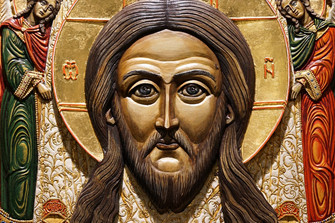If Christianity is to have a worthwhile message to the contemporary world, it must be based on the vision of God that we have received from Jesus himself. It must be based on what He himself saw his mission to be.
 Jesus came, not in the form of military or political leader but as the embodiment of God's own life in His own life. He came not to conquer and destroy, but to heal and save. He came, not as lofty king, but as humble servant. And, in the final analysis, He came to liberate - not through the power of the sword, but through the power of love.
Jesus came, not in the form of military or political leader but as the embodiment of God's own life in His own life. He came not to conquer and destroy, but to heal and save. He came, not as lofty king, but as humble servant. And, in the final analysis, He came to liberate - not through the power of the sword, but through the power of love.
Jesus was convinced that the presence of God's Spirit is evident in the very basic human interactions of mercy, compassion, forgiveness, working for peace and justice, generosity and respect for human dignity. His whole life reflected these convictions: His words would be "good news" for the poor, they would bring freedom to those held captive, bring sight to the blind and would set the downtrodden free.
His message brought excitement to those who listened. The reign of God was "at hand." He told them how to recognize this kingdom: by living in God and living in love - clothing the poor, caring for the needy, being ready to forgive, feeding those who hunger, overcoming cultural prejudices… this is how the world would recognize the name and presence of God's Spirit in their midst.
Just to make sure that His disciples understood what His message was all about, Jesus asked them two very pointed questions: Who do people say that I am? Who do you say that I am? The answers to these questions go beyond mere excitement and enthusiasm, and touch the very makeup of the call to discipleship. As the first disciples came to understand who Christ really was and what He was about, they also came to realize what challenges were in store for them as they preached the "Good News."
Who do you say that I am? The Lord asks the same question and offers the same challenge to us. He sends us on our own journey of faith and gives us the necessary tools to travel our different paths: Love of God and Love of Neighbor.
We don't have to travel thousands of miles or make all kinds of sacrifices to avail ourselves of his offer. We don't have to look very far to find our neighbor. We need only to accept His promise and His presence with faith; then he provides the strength for us to walk His way, to live his life, to be faithful to his gospel. And we must be able to articulate this Gospel with clarity and enthusiasm.
At the heart of today's Gospel message is the challenge to lose ourselves in concern for others. If we truly love every other person as Jesus has loved us, then we don't look at risk, or color, or public opinion, or all of the other excuses for walking away.
Do you know who I am? Do you know me? Jesus' question is addressed to us now. And we, His followers answer readily, "You are the Christ. You are the Messiah. You are the Son of the Living God." But there is an implied crucial follow-up question as well: "How well do we know Him?"
Do we know Him well enough to trust His promise to lead us into eternal life with God who is Love? Do we trust in His promise that we will discover our life's true meaning and purpose in and through our love for one another?
The world around us is also asking: "Who are you? What are you about? Why do you do what you do?" Hopefully, everything we say and do will proclaim very loudly and clearly: "We are faithful followers of Jesus Christ, who we procalim as our Lord and Savior. We are His hands, His eyes, His heart, His body. We bring His light and truth to our world. In His name, and by His power, we are trying to remake the face of the earth, to renew our world, to overcome evil and suffering, to restore all things in Him."





